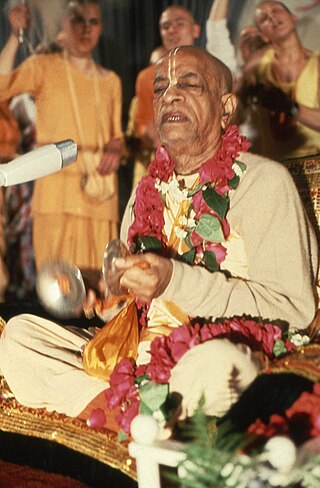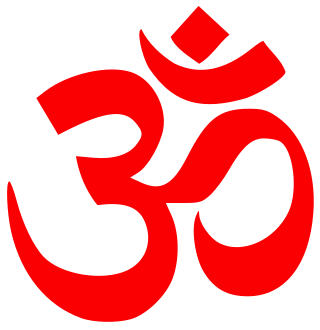
A. C. Bhaktivedanta Swami Prabhupada was a spiritual, philosophical, and religious teacher from India who spread the Hare Krishna mantra and the teachings of "Krishna consciousness" to the world. Born as Abhay Charan De and later legally named Abhay Charanaravinda Bhaktivedanta Swami, he is often referred to as "Bhaktivedanta Swami", "Srila Prabhupada", or simply "Prabhupada".

The International Society for Krishna Consciousness (ISKCON), known colloquially as the Hare Krishna movement, is a Gaudiya Vaishnava Hindu religious organization. It was founded on 13 July 1966 in New York City by A. C. Bhaktivedanta Swami Prabhupada. Its main headquarters is located in Mayapur, West Bengal, India.

Hinduism has been spread in Russia primarily due to the work of scholars from the religious organization International Society for Krishna Consciousness (ISKCON) and by itinerant Swamis from India and small communities of Indian immigrants. While ISKCON appears to have a relatively strong following in Russia, the other organizations in the list have a marginal presence in this country. There is an active Tantra Sangha operating in Russia. According to the 2012 official census, there are 140,010 Hindus in Russia, which accounts for 0.1% of the population of Russia.

According to the Book of Idols by the medieval Arab scholar Hisham ibn al-Kalbi, Hinduism was present in pre-Islamic Arabia. Ibn Al-Kalbi explains the origins of idol worshipping and the practice of circumambulation as rooted in India and Hinduism.

Hinduism is the Fourth-largest religion in Myanmar, being practised by 1.7% of the population of Myanmar. Hinduism is practised by about 890,000 people in Myanmar, and has been influenced by elements of Buddhism, with many Hindu temples in Myanmar housing statues of the Buddha. There are also a large population of Hindus in which the Myanmar Tamils and minority Bengali Hindus having the biggest population share.

Hinduism is a minority religion constituting about 0.15% of the population of Austria. Hinduism is not one of the 16 recognised religions in Austria. The Austrian law allows religious groups not recognized as societies to seek official status as confessional communities with the Office for Religious Affairs. Hinduism is one of the eight confessional communities in Austria. However, the Sahaja Yoga and the International Society for Krishna Consciousness are categorised as associations, not as confessional communities.

Hinduism is currently practiced by a minority of residents of China. The religion itself has a very limited presence in modern mainland China, but archaeological evidence suggests a significant presence of Hinduism in different provinces of medieval China. Hindu influences were also absorbed in to Buddhism and got mixed with Chinese mythology over its history. Practices originating in the Vedic tradition of ancient India such as yoga and meditation are also popular in China.

Bhaktivedanta Manor is a Gaudiya Vaishnava Hindu temple set in the Hertfordshire countryside of England, in the village of Letchmore Heath near Watford. The Manor is owned and run by the International Society for Krishna Consciousness (ISKCON), better known as the Hare Krishna movement. It is ISKCON's largest property in the United Kingdom, and one of the most frequently visited Radha Krishna temples in Europe. The house is listed Grade II on the National Heritage List for England.

Hinduism in Mongolia is a minority religion; it has few followers and only began to appear in Mongolia in the late twentieth century. According to the 2010 and 2011 Mongolian census, the majority of people that identify as religious follow Buddhism (86%), Shamanism (4.7), Islam (4.9%) or Christianity (3.5). Only 0.5% of the population follow other religions.
Hinduism in Kazakhstan is represented mainly by the ISKCON followers and by expatriate Hindus from India. The Census in Kazhakhstan doesn't recognize Hinduism. According to an estimate, there are about 500 Hare Krishna devotees in Kazakhstan. In 2010, there were 801 (0.005%) Hindus in Kazakhstan according to the ARDA. As of 2020, there were about 1878 (0.01%) Hindus in Kazakhstan.

Hinduism is a minority religion in Belgium. According to the PEW 2014, Hinduism is also the fastest growing religion in Belgium. Attempts have been done by the Hindu Forum of Belgium (HFB) to make Hinduism an officially-recognized religion in Belgium.

The earliest evidence of Hinduism in Tanzania is from the 1st millennium AD when there was trade between East Africa and Indian subcontinent. Most of these traders came from Gujarat, Deccan and the Chola empire. Archaeological evidence of small Hindu settlements have been found in Zanzibar and parts of Swahili coast, Zimbabwe and Madagascar.

Hinduism was first introduced by Sindhi settlers who migrated to Ghana after India was divided in 1947. It was spread to Ghana actively by Ghana's Hindu Monastery headed by Swami Ghananand Saraswati and by the International Society for Krishna Consciousness (ISKCON). Hinduism is one of the fastest growing religions in Ghana.

Hinduism is a minority religion in Spain.

Hinduism is a minority religion in Hungary. According to the 2022 census, there were 3,307 Hindus in Hungary.

Hinduism is a minority religion in Sweden practised by 0.13% of the population or 13,000 people out of a population of 10.5 million. Hinduism is practised mainly by persons of Indian origin and non-resident Indians together. A majority of them are Tamils, Punjabis, Bengalis, Gujaratis, Telugu's and Kannadigas.

Hinduism is one of the fastest growing religions in Northern Ireland with over 4,000 Hindus in the country, making up 0.22% of the population. There are currently 3 Mandirs in Belfast alone: Radha-Krishna Temple in Malone Road, Laxmi-Narayan Mandir in Clifton Street and Radha Madhava Mandir (ISKCON) in Upper Dunmurry Lane. There is also a Hare Krishna Centre on Inish Rath Island that was established in 1985.

An ISKCON guru is a person who is permitted to initiate disciples into the International Society for Krishna Consciousness system. The guru system has undergone several changes and reform since its beginnings in the 1960s. Upanayana as a traditional "sacred thread ceremony" of the Gayatri Mantra, commonly known Hindu Samskara, is complemented by Pancaratric mantras of the Gaudiya Vaishnava sampradaya and follows the principal initial nama initiation ceremony, referred to respectively as brahmana diksa and Hari nama diksa.

Sri Radha Krishna-Chandra Temple is one of the largest Krishna-Hindu temples in the world. It is situated in Bangalore in the Indian state of Karnataka. The temple is dedicated to Hindu deities Radha Krishna and propagates monotheism as mentioned in Chandogya Upanishad.

ISKCON Temple Chennai, also known as the Sri Sri Radha Krishna Mandir, is a Gaudiya Vaishnavism temple in Chennai, India. The temple is dedicated to Supreme Lord Krishna and His divine consort Radha. It was formally inaugurated on 26 April 2012.













